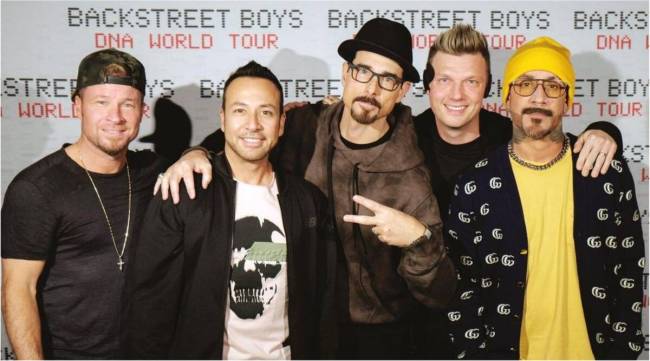Opinion Backstreet Boys in India: Partying like it is 1999
At the Backstreet Boys concert in India, both the performers and the audience danced and sang their hearts out — every word, every note infused with memories of years passed
 Backstreet Boys: AJ McLean, Nick Carter, Kevin Richardson, Brian Littrell and Howie Dorough. (Photo: Backstreet Boys/Instagram)
Backstreet Boys: AJ McLean, Nick Carter, Kevin Richardson, Brian Littrell and Howie Dorough. (Photo: Backstreet Boys/Instagram) Let’s be honest, boy bands were never “cool”. Sure, they were popular — particularly, in the post-liberalisation era of MTV and Channel V, of Planet M and Music World, of audio cassettes and compact discs — but they were not cool.
But you did not know this when you heard a boy band for the first time. Back then, the “coolness” quotient of music was defined by its nationality, its language. Western pop music, in all its exotic foreign splendour, was automatically deemed to be cooler than the default alternative — Hindi film music. So when you borrowed your first mix tape of English pop songs and played it on your Sony Walkman, it was a revelation. You were thrilled, more than anything else, by the accents emanating from your headphones. Was this how English was actually supposed to be spoken?
You mouthed the words, feeling your way around the ebbs and flows of the music, and soon enough, you were singing along during the chorus, enunciating in perfect mimicry of the voices crooning in your ears. You would try, on occasion, to slip into that accent during normal conversations, but the effect was jarring. Without music, the rhythm of their speech was not yours to claim.
Before long, you were navigating the internet to consume as much information as you could about NSYNC, Boyzone, Westlife, and especially, Backstreet Boys. In the age of dial-up connections, this was slow going. Webpages would load at a glacial pace: Brick by brick, line by line, imparting invaluable lessons in patience. Pictures would reveal themselves in stages, pixels slowly transforming into faces. It was painstaking work but it was necessary. For one, it allowed you to read the correct lyrics of your favourite songs — you had come to learn that your ears could not be wholly trusted in this regard. And more importantly, you believed this was knowledge that would gain you entry into the coveted club of “English music lovers” at school and embellish your credentials as a cool kid.
Imagine then, your consternation when instead of membership, all your championing of Backstreet Boys earned you, was ridicule. A kind-hearted member of the club would later explain to you that being a fan of boy bands didn’t cut it. What with their synchronised dancing and coiffed hair, boy bands didn’t produce real music. What one really ought to listen to, he would advise with an arm around your shoulder, was rock music. Guns N’ Roses, Deep Purple, Bon Jovi, Aerosmith, Pink Floyd, The Beatles — now that was cool; that was music that could offer you the most coveted prize of your teenage years. Validation.
In the years that followed, your days of singing along with the Backstreet Boys soon became a distant, and somewhat squeamish, memory. They never featured in any conversation about your favourite music artists. You thought you had outgrown them. You believed your taste in music had evolved and that you had little time for banal lyrics set to synth-pop beats. And yet, every time Quit Playing Games (with My Heart) came on TV, you would not change the channel. At parties, someone would inevitably play Everybody (Backstreet’s Back) and you would be swept up in the euphoria coursing through the room. You would be corralled into singing I Want It That Way at karaoke sessions and would be a little embarrassed at remembering all the words.
It was when you hit your mid-thirties, that something changed. Your sense of self — no longer tethered to the world’s perception of your choice in music — finally allowed you to acknowledge that you enjoy listening to As Long As You Love Me. You found yourself amongst friends who could reminisce about a childhood crush while humming Drowning. You no longer felt the need to hide your affection for the Backstreet Boys; instead, you learnt to embrace it, take guiltless pleasure in it. Naturally, when Backstreet Boys announced their tour of India, you did not waste a moment in booking your tickets.
In 1993, AJ McLean, Nick Carter, Kevin Richardson, Brian Littrell and Howie Dorough (the quintet who are the Backstreet Boys) had performed their “first big show together”, most of them still teenagers then. Thirty years later, when they — now unabashedly, gloriously middle-aged — take the stage on a balmy May evening of 2023, thousands of contemporaneous, middle-aged Indians burst into rapturous applause. The occasion had a feeling of serendipity. Backstreet Boys had not expected this reception and their fans had not expected they would get to relive their childhood.
For the next two hours, both the performers and the audience would dance and sing their hearts out; every word, every note infused with memory and reverberating through the years. For the next two hours, thousands would forget their present that was burdened with adult responsibilities, and lose themselves in a fondly remembered past of youthful abandon. For the next two hours, people would — at AJ’s urging — “party like its 1999”.
Would all of this mean that boy bands had finally become cool? The real question is, did it ever matter?
The writer is a lawyer based in Mumbai






